Day 1. Trip to Belarus, Zvaniec marsh

In the first series of our video diary we tell about the beginning of the journey – how we traveled from Lithuania to Zvaniec wetland … read more
In 2018-2019 the first ever Aquatic Warbler translocation was implemented. In two years, 100 chicks have been relocated from the biggest world population of Aquatic Warblers in Belarus – Zvaniec fenmire – to a small and and decreasing population in Žuvintas, Lithuania. This tested a nature conservation method that has never been used with the species before – translocation. In this short movie the method and the first results are presented.
In 2023-2024 the second round of translocation is being implemented in Poland. 100 chicks from Biebza wetlands will be transfered to Rozwarowo marshes at the border of Poland-Germany.
This method works just like a blood donation: a small portion of birds are taken from a healthy, viable population in order to save another – sick and endangered – population. In this way we could revive these weak populations or even save ones that are completely gone. This method is radical and risky, but one of the few options left to help this species. 95% of Aquatic Warblers have disappeared during the last century and the world population is still decreasing, especially at the edges of the range. Here populations cannot recover naturally even if habitats are restored to excellent condition.
As many as 99 of them were successfully grown and released into the fenmire by naturalists. Already after the first year of translocation, naturalists were happy about the success of this method. Bird countings revealed that out of the 49 birds brought from Belarus and released into freedom last year, at least 11 (22%) have returned from wintering in Africa to Žuvintas, and translocated female birds are successfully raising nestlings. This indicator exceeded even the natural return rate of first year birds (20%). In the second year, 7 translocated birds from the last year were found in Žuvintas. Also 3 males that were brought here two years ago were observed. After translocation, the population of Aquatic Warbler‘s in Žuvintas hit record high. In 2020 historically the biggest population of these rare birds were observed. This shows that the translocation method works and is effective. In 2021 during national counting in Žuvintas 3 translocated singing males were noticed. One of them was transferred here in 2018, so, it had been singing 3 seasons in Žuvintas. If we consider that warblers live approx. 3-4 years, we would conclude with kind of happy fact that translocated birds raised in the new place, spend almost whole their life in a new home. In 2022 there were no translocated birds found in Žuvintas.
While preparing for the translocation all details were thought through in the Programme of Aquatic Warbler translocation. The document was developed together with Scientific Advisory Board having the most prominent experts and researchers of the species. It was also approved by national institutions in Lithuania. Simplified version of the programme was prepared for the local inhabitants and nature lovers.
More about this unique expedition you can find out by looking into impressions from 2018 and 2019 bellow.
In 2018, the first stage of Aquatic Warbler translocation took place. 50 Aquatic Warbler chicks were brought to Žuvintas from the Zvaniec swamp. It was the first time anyone had tried out the translocation method with this species, so we were very focused and we felt a great responsibility. We did our best to raise all the babies, so that they would learn to live in freedom and return to Žuvintas after the wintering in Africa. It was an exciting and challenging experience.
Find out more by looking into videos and pictures.
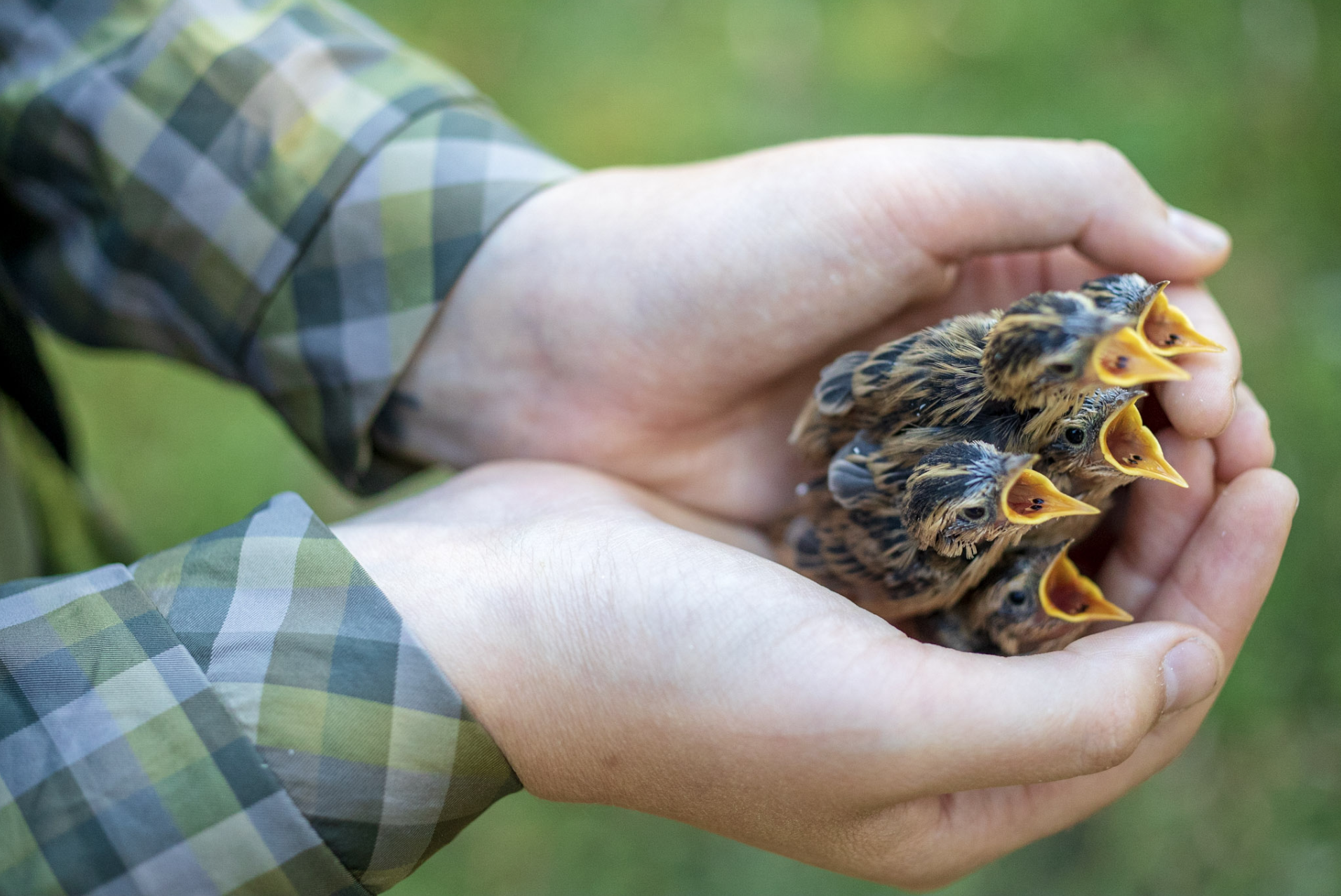
You can join the journey of the Aquatic Warbler babies from Belarus to Lithuania in 2019 by watching our video blog. Shortened video series are now available in English! In our video stories you will get to know how all expedition took place, what challenges we faced, what joyful and nervous moments we had. Join our unique journey!
In 2019 the second stage of Aquatic Warbler translocation took place. 50 juveniles were translocated from Zvaniec mire, in Belarus to Zuvintas, in Lithuania.

In the first series of our video diary we tell about the beginning of the journey – how we traveled from Lithuania to Zvaniec wetland … read more
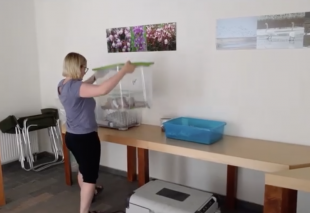
While part of the team takes care of the little birds in Belarus and prepares for a very demanding trip, the rest of our team … read more
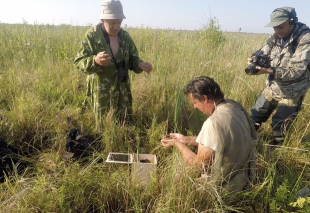
The second day of the journey. The translocation of aquatic warbler juveniles begins well before the real transportation of birds. First of all, ornithologists settle … read more

From early morning to late evening. From sunrise to the sunset. That’s how long it takes to feed our juveniles. Before the sunset we fed … read more
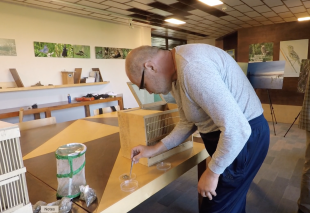
After a 12-hour journey, the baby birds and our team reached Žuvintas. The juveniles were carefully examined by ornithologist Vitalij, who has many years of … read more
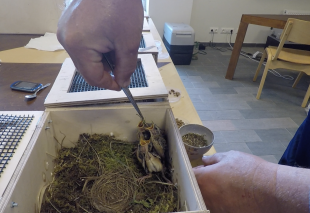
Growing up the baby birds requires a lot of work. They eat a lot, so most of the time our team prepares a variety of … read more

The juveniles are successfully growing, successfully asking for food, and the little sick bird is getting better. Today we talk about why we need to … read more

Some of the chicks are already jumping in cages, some – in boxes, but they are already trying to escape, especially when they are looking … read more
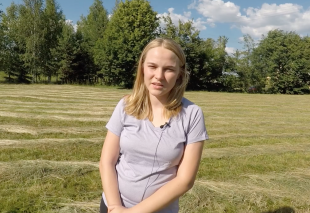
The chicks are growing very fast and many of them have already been moved from small boxes to larger cages. The birds loudly demand food … read more

Baby-birds are growing very fast. There is only one family left in the small box. All the other juveniles are already moved to the cages … read more

All nests have already been moved from small boxes to the cages. How fast the birds grow! In this video we briefly recall that extraordinary … read more

We continue to search for females with our Belarusian colleagues. We are pleased to confirm that we have found 11 returned birds out of 49 … read more

In the morning, Belarusian colleagues continued their search for aquatic warbler females, and in the evening they ringed the birds with special rings. More about … read more
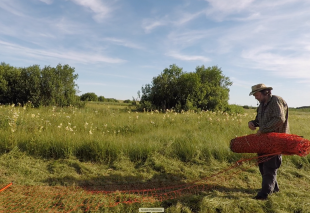
In the early morning of Midsummer day, we make a salad for the birds. For the last time, we discuss the situation in Zuvintas with … read more

Today dr. Vaidas Palinauskas took the blood samples of translocated Aquatic Warblers. Our team also weighed the birds. Blood will be used to determine the … read more

In these days, preparations were being made to move the baby-birds to outdoor aviaries in the fenmire and for weekend events. After some extremely windy … read more

Volunteers help us a lot during the translocation of Aquatic Warblers. As many as 6 girls from Šilutė Vydūnas Gymnasium and two biology teachers helped … read more

Although the birds are already in the fenmire, the care of the juveniles is intensive. Volunteers are helping us a lot. Akvilė is one of … read more

The taking care of the aquatic warbler babies is full of surprises and discoveries. This morning in the insect-tent we found a praying mantis in … read more

In the evening before, we prepared the avaries for the release of the baby-birds by moving the reed wall to the other side in order … read more

For few days another German colleague – Dr. Cosima Tegetmeyer is visiting us. She tries to get all the experience and know-how our team gained … read more

The inauguration of the new President of the Republic of Lithuania is taking place and we are symbolically leaving the fenmire. This is where a … read more